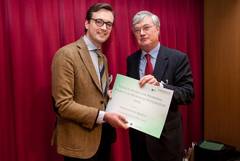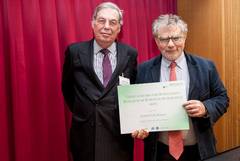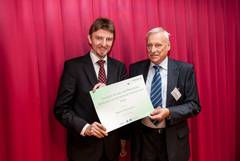

THESEUS Awards 2015
THESEUS Award for Outstanding Research on European Integration
The THESEUS Award for Outstanding Research on European Integration 2015 goes to Prof Dr Joseph H. H. Weiler, European University Institute, Florence.
Joseph H. H. Weiler is President of the European University Institute (EUI). Previously he served as Professor of Law and Jean Monnet Chair at Harvard Law School and subsequently as Director of the Jean Monnet Center at NYU School of Law. Weiler is Editor-in-Chief of the European Journal of International Law (EJIL) and the International Journal of Constitutional Law (ICON). He furthermore is Honorary Professor at University College London, the University of Copenhagen, and the National University of Singapore, and Co-Director of the Academy of International Trade Law in Macao, China.
Weiler holds a PhD in European Law from the EUI, Florence, and honorary degrees from various European universities. He is author of several books and articles in the field of European integration, notably "The Constitution of Europe: 'Do the new clothes have an emperor?'" (Cambridge University Press, 1999), "Un'Europa cristiana: Un saggio esplorativo" (BUR Saggi, Milano, 2003), and the novella "Der Fall Steinmann" (Piper, 2000). He is currently completing a new book titled "Reconsidering the Trial of Jesus – A Reading for our Times".
THESEUS Award for Promising Research on European Integration
Dr Leonhard den Hertog is rewarded with the THESEUS Promising Award for his work "The rule of law in the external dimension of EU migration and asylum policy – organisational dynamics between legitimation and constraint".
 |
Dr Leonhard den Hertog is working as a postdoctoral researcher for a joint project with Maastricht University at the Justice and Home Affairs section of the Centre for European Policy Studies (CEPS) in Brussels. Coming from a legal background with an LLM from Utrecht University, his research finds itself at the nexus between Law and Politics. It was manifested during his activities as a researcher at the Jean Monnet Chair, Prof Wessels, at the University of Cologne enrolled in the 'EXACT' Marie Curie project, as well as in his subsequent teaching at the Faculty of Law in Leuven, and his publications. In his current work at CEPS, his research also takes a critical policy-relevant perspective. His research focuses on the EU's Justice and Home Affairs policies, in border control or migration and asylum policy, and their interplay with the EU's external relations policy. He currently reflects EU funding in these fields and analyses the possible establishment of a European Border and Coast Guard.
PhD Thesis: "The rule of law in the external dimension of EU migration and asylum policy – organisational dynamics between legitimation and constraint"
Dr Leonhard den Hertog's thesis is an interdisciplinary work of legal and political science enquiring the role that a constitutional principle, namely the rule of law, can play in the external dimension of EU migration and asylum policy. Latter is a field of EU external relations characterised by its potential repercussions for the rights of individuals. It thus presents a crucial field of EU external relations to study the role of the rule of law. His thesis argues that the divergent adherence to the rule of law of the EU in this field can be understood through the lens of organisational theory. The role of organisations' environments is given special attention under this approach, as they generate the demands to which organisations respond for their legitimacy. The thesis was funded by the EU, namely within the Marie Curie Initial Training Network on EU external relations ('EXACT').
Leonhard den Hertog engaged as speaker on asylum and migration policy in the THESEUS Summer School 2015.
Dr Martin Mendelski is rewarded with the THESEUS Promising Award for his work "The Limits of the European Union’s Transformative Power: Pathologies of Europeanization and Rule of Law Reform in Central and Eastern Europe".
Dr Martin Mendelski studied European Studies at Viadrina University, Frankfurt/Oder and obtained his PhD from the University of Luxembourg. Mendelski's held positions at renowned institutions such as the Max Planck Institute for the Study of Societies (MPIfG), the European University Institute (EUI) as well as Harvard University. The latter demonstrates that he does not only take the European, but also the international perspective into account in his research. His current post-doctoral project at the University of Trier and the MPIfG (from October 2016) examines the role of the EU in the development of "varieties of capitalism" in Central and Eastern Europe. As a member of anticorrp.eu (funded by FP7), he is moreover analysing the EU's effectiveness in curbing corruption.
PhD Thesis: "The Limits of the European Union’s Transformative Power: Pathologies of Europeanization and Rule of Law Reform in Central and Eastern Europe"
Dr Martin Mendelski's thesis examines the impact of the EU on the development of the rule of law in Central and Eastern Europe. The topic is addressed through a mixed methods study, which consists of a quantitative comparative analysis and three qualitative case studies on Poland, Romania and Moldova. The empirical analysis is based on an innovative set of indicators and numerous qualitative interviews. The findings of the study suggest that the impact of the EU is differential – both healthy (in Poland) and pathological (in Romania and Moldova). He explains the dissimilar impact across countries with varying reforms. The thesis develops the notions of the "EU's pathological power" and "pathologies of Europeanization".
The THESEUS Awards have been transmitted during the THESEUS Final Conference on 17 March 2016.

